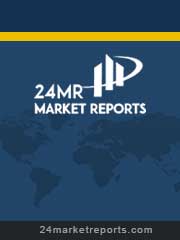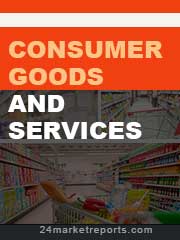
Download FREE Report Sample
Download Free sample
MARKET INSIGHTS
Global functionality CBD beverages market size was valued at USD 57.9 million in 2024. The market is projected to grow from USD 76.3 million in 2025 to USD 313 million by 2032, exhibiting a CAGR of 27.9% during the forecast period.
Functionality CBD beverages are drinks infused with cannabidiol (CBD), the non-psychoactive compound derived from hemp plants. These products combine hydration with potential wellness benefits, positioning them within the broader functional beverage category that addresses specific consumer health needs. The sector includes various formats such as sparkling waters, teas, coffees, and juices, each offering different CBD concentrations and complementary functional ingredients.
Market growth is being driven by increasing consumer preference for health-focused beverages and growing acceptance of CBD products. However, regulatory challenges across different regions and quality control issues pose significant hurdles. Key players like Canopy Growth Corporation and Molson Coors Brewing are actively expanding their product portfolios through strategic partnerships and innovation to capture market share in this high-growth segment.
Rising Consumer Preference for Functional and Wellness-Focused Beverages Accelerates Market Growth
The global functionality CBD beverages market is experiencing robust growth, driven by increasing consumer demand for health-oriented beverages that offer additional wellness benefits. CBD-infused drinks have gained significant traction due to their perceived advantages in stress relief, relaxation, and pain management. Recent market analysis indicates that over 60% of consumers aged 18-34 actively seek functional beverages that address specific health concerns, with CBD products ranking among the top three categories in this demographic. This shift toward health-conscious consumption patterns is reshaping beverage industry dynamics, creating substantial opportunities for CBD-infused products. Major beverage companies are responding to this trend by expanding their CBD product portfolios. In 2023, several prominent brands launched new lines of CBD-enhanced sparkling waters, teas, and functional juices, further validating the category's mainstream potential.
Regulatory Progress and Legalization Trends Create Favorable Market Conditions
To know more about market statistics, Download a FREE Sample copy
The gradual global acceptance of hemp-derived CBD products continues to remove barriers to market entry and expansion. While regulatory frameworks vary by region, positive developments in key markets are accelerating industry growth. The 2018 Farm Bill in the United States, which legalized hemp-derived CBD at the federal level, remains a watershed moment for the industry. In Europe, regulatory clarity is improving, with the European Food Safety Authority progressing toward establishing comprehensive guidelines for CBD products in food and beverages. This evolving legal landscape has encouraged both established beverage companies and startups to invest in CBD product development. Market projections suggest that countries with clearer CBD regulations experience 3-4 times faster market growth compared to those with restrictive policies.
➤ The recent approval of certain CBD isolate formulations for food and beverage applications in several international markets has provided manufacturers with greater formulation flexibility and product development opportunities.
Furthermore, increasing scientific research into the potential health benefits of CBD is bolstering consumer confidence. Ongoing clinical studies examining CBD's effects on anxiety, inflammation, and sleep quality are generating positive preliminary results, which continues to shape product positioning and marketing strategies across the industry.
MARKET CHALLENGES
Regulatory Uncertainties and Compliance Complexity Hinder Market Expansion
Despite growing acceptance, the functionality CBD beverages market faces significant regulatory challenges that impact product development and distribution. The lack of harmonized global regulations creates a fragmented marketplace where companies must navigate varying requirements across jurisdictions. In some regions, conflicting regulations between national and local authorities create operational uncertainties, particularly regarding permissible CBD concentrations, labeling requirements, and health claim substantiation. These regulatory hurdles increase compliance costs and delay market entry for new products. Current estimates suggest that regulatory compliance expenses can account for 15-20% of total product development costs in this sector, creating a substantial barrier for smaller manufacturers.
Other Challenges
Consumer Education Gap
Many potential consumers remain unfamiliar with CBD's properties and effects, leading to hesitation in trying CBD beverages. Market research indicates approximately 40% of consumers express uncertainty about CBD's legality, psychoactive effects, or appropriate dosage levels when considering these products.
Supply Chain Complexities
The CBD extraction and purification process requires specialized expertise and equipment. Fluctuations in hemp biomass quality and availability can impact product consistency, while the lack of standardized testing protocols for CBD potency and purity adds another layer of complexity to quality control processes.
Limited Retail Distribution Channels Constrain Market Penetration
The functionality CBD beverages market faces distribution challenges that limit broader consumer access. Many traditional retail outlets remain hesitant to carry CBD products due to lingering regulatory uncertainties or corporate policies. While e-commerce has emerged as an important distribution channel, representing approximately 35% of total CBD beverage sales, physical retail placement remains critical for mainstream adoption. Major grocery chains and convenience stores typically require extensive product testing and regulatory clearance before stocking CBD beverages, creating longer lead times for market entry. Additionally, payment processing restrictions for CBD products continue to present operational challenges for both online and brick-and-mortar retailers.
Furthermore, the market faces competition from other functional beverage categories, particularly those containing adaptogens, nootropics, or other cannabis-derived compounds. Emerging alternatives such as CBG or Delta-8 THC beverages in legal markets are beginning to capture consumer attention, potentially diverting interest from traditional CBD offerings. This competitive landscape requires manufacturers to continually innovate their product formulations and marketing strategies to maintain market share.
Innovation in Product Formulations and Delivery Systems Presents Growth Potential
The functionality CBD beverages market offers substantial opportunities for innovation in product development. Advances in nanoemulsion and microencapsulation technologies are enabling manufacturers to create CBD beverages with improved bioavailability, faster onset times, and more predictable effects. These technological improvements address key consumer concerns about product efficacy and consistency. Market leaders are also exploring combination formulations that pair CBD with other functional ingredients like adaptogens, vitamins, or botanicals to create targeted wellness solutions. The sleep aid segment, combining CBD with melatonin or magnesium, has shown particular promise, with growth rates exceeding 40% year-over-year in some markets.
Additionally, the emergence of new consumption occasions presents untapped potential for market expansion. CBD beverages positioned for specific dayparts (such as morning focus or evening relaxation), fitness recovery, or social settings are gaining traction among distinct consumer segments. The development of CBD beverage products tailored for the hospitality industry, including bars, restaurants, and hotels, represents another promising avenue for growth as consumer familiarity with CBD continues to increase.
The growing interest in sustainable and clean-label products also creates opportunities for differentiation. Consumers increasingly prefer beverages made with organic, ethically sourced CBD and natural ingredients. Brands that can authenticate their sourcing practices and product purity through third-party testing and certification are positioned to command premium pricing and build stronger consumer trust in this evolving market.
Health Product Use Segment Dominates Due to Rising Consumer Demand for Wellness Beverages
The market is segmented based on type into:
Medicinal Use
Health Product Use
Subtypes: CBD-infused waters, energy drinks, teas, and others
Online Channel Grows Rapidly Due to E-commerce Expansion and Direct-to-Consumer Sales
The market is segmented based on application into:
Offline Channel
Subtypes: Supermarkets, specialty stores, pharmacies
Online Channel
Ready-to-Drink CBD Beverages Lead the Market Owing to Convenience and Portability
The market is segmented based on product form into:
Powders
Concentrates
Ready-to-drink
Hemp-Derived CBD Dominates the Market Due to Legal Advantages and Cost Effectiveness
The market is segmented based on CBD source into:
Hemp-derived
Marijuana-derived
Strategic Partnerships and Product Innovation Drive Market Competition
The global functionality CBD beverages market features a dynamic competitive landscape with a mix of established beverage companies and emerging CBD specialists vying for market share. The market remains moderately fragmented as regulatory frameworks continue to evolve across different regions, creating both opportunities and challenges for market participants.
Canopy Growth Corporation has emerged as a market leader, leveraging its first-mover advantage in cannabis derivatives and strong distribution network across North America and Europe. Their recent partnership with Constellation Brands has significantly enhanced their production capabilities and market reach. Meanwhile, Molson Coors Brewing has successfully diversified into the CBD space through its joint venture with Hexo Corp, demonstrating how traditional beverage giants are adapting to this growing segment.
Specialized players like Phivida Holdings and American Premium Water are carving out significant niches through product differentiation, focusing on organic ingredients and functional benefits beyond basic CBD infusion. These companies are particularly strong in the direct-to-consumer online channel, which accounted for approximately 32% of total CBD beverage sales in 2024 according to market surveys.
The competitive intensity is further heightened by entry from non-alcoholic beverage companies. The Alkaline Water Company and HYBT have successfully expanded their product lines to include CBD-infused variants, capitalizing on existing distribution networks and brand recognition. This trend reflects the broader market shift toward functional beverages as consumer preference moves away from traditional soft drinks.
European markets show a slightly different competitive dynamic, with companies like Heineken pioneering CBD-infused beverages through their Lagunitas brand. The company's recent launch in select European markets demonstrates how multinationals are carefully navigating regional regulatory landscapes while building CBD beverage capabilities.
Canopy Growth Corporation (Canada)
American Premium Water (U.S.)
Heineken N.V. (Netherlands)
Sprig (U.S.)
Phivida Holdings (Canada)
Love Hemp Water (U.K.)
HYBT (U.S.)
Alkaline Water Company (U.S.)
Molson Coors Brewing Company (U.S.)
Competition in the functionality CBD beverage sector continues to intensify as companies battle for shelf space in both physical retail and e-commerce channels. Product innovation has become a key differentiator, with leading players introducing beverages that combine CBD with additional functional ingredients like adaptogens, nootropics, and vitamins. This product sophistication reflects the industry's response to increasingly discerning consumers who seek specific health and wellness benefits from their beverages.
The market has also witnessed strategic acquisitions as larger players seek to quickly establish CBD beverage capabilities without building them organically. Regulatory expertise has become a critical competitive advantage, particularly as regional differences in CBD concentration limits and marketing claims require specialized knowledge to navigate effectively.
The global functionality CBD beverages market is experiencing robust growth, fueled by increasing consumer preference for health-conscious products. With the market projected to grow at a CAGR of 27.9% through 2032, this surge stems from CBD's non-psychoactive health benefits including stress relief, pain management, and sleep improvement. Beverage manufacturers are innovating with CBD-infused sparkling waters, teas, and energy drinks to capitalize on this demand. Recent product launches in North America and Europe highlight formulations combining CBD with adaptogens and nootropics, creating multi-functional beverages that appeal to wellness-focused demographics.
Regulatory Developments Accelerate Mainstream Adoption
Evolving cannabis regulations in key markets are removing barriers for CBD beverage commercialization. The 2023 FDA draft guidance on CBD product safety and the EU's Novel Food authorization process are creating clearer pathways to market. This regulatory progress has enabled major beverage companies to enter the space, with product availability expanding from specialty stores to mainstream supermarkets. However, inconsistency in international regulations continues to present challenges for global distribution strategies.
The market is witnessing a premiumization trend with brands developing sophisticated flavor profiles using organic ingredients and advanced emulsion technologies to improve CBD solubility and bioavailability. Cold-brew CBD coffees and craft-style CBD beers represent growth segments, blending functionality with premium beverage experiences. Consumer preference data shows over 65% of buyers prioritize taste and formulation quality when selecting CBD beverages, driving continuous product innovation across categories including functional waters and recovery-focused sports drinks.
North America
North America leads the global functional CBD beverages market, driven by robust consumer demand for wellness-oriented products and progressive regulatory frameworks. The U.S. accounts for the majority of sales, with market leaders such as Canopy Growth Corporation and Alkaline Water Company capitalizing on FDA-compliant product formulations. Despite federal complexities, the 2018 Farm Bill's hemp legalization has accelerated CBD beverage adoption. Health-conscious consumers prioritize convenience and efficacy, boosting demand for ready-to-drink CBD-infused sparkling waters, teas, and energy drinks. Retail penetration is strong via both online platforms and mainstream grocery chains like Whole Foods. However, state-level variations in THC limits and labeling requirements create operational challenges for manufacturers.
Europe
Europe's market growth is propelled by relaxed cannabis laws and a thriving nutraceuticals sector. The EU Novel Food Regulation shapes product approvals, favoring brands like Love Hemp Water that emphasize organic certification and traceability. Germany and the UK dominate consumption, with CBD beverages positioned as premium lifestyle products in health stores and e-commerce. Functional benefits such as stress relief and sleep enhancement drive demand, particularly among urban professionals. Though the European Food Safety Authority (EFSA) maintains cautious oversight, innovations in nanoemulsion technology are improving bioavailability—a key selling point. Cross-border e-commerce facilitates accessibility, but regulatory alignment gaps between member states persist.
Asia-Pacific
The Asia-Pacific market exhibits high growth potential but faces stringent regulatory hurdles. While China and Japan cautiously explore hemp-derived CBD for medical applications, Thailand recently emerged as a regional leader by legalizing low-THC beverages. India’s Ayurvedic tradition aligns with CBD wellness positioning, yet regulatory ambiguities restrain commercial scaling. Australia and New Zealand have established clearer guidelines, attracting investments from global players like Phivida Holdings. Price sensitivity favors local startups producing affordable CBD teas and tonics, though imported premium brands gain traction in cosmopolitan hubs. Cultural skepticism remains a barrier, requiring extensive consumer education campaigns.
South America
South America’s market is nascent but expanding, with Brazil and Argentina at the forefront. Brazil’s ANVISA recently approved CBD for medicinal use, creating spillover demand for functional beverages among holistic health adopters. Economic volatility limits mass-market scalability, but urban middle-class consumers increasingly seek CBD-infused energy drinks and herbal tonics. Argentina’s cannabis-friendly policies encourage local production, though banking restrictions complicate international trade. The region’s herbal medicine traditions provide a culturally receptive environment, but inconsistent enforcement of labeling standards and THC thresholds deter large-scale investments.
Middle East & Africa
The MEA region remains constrained by prohibitive cannabis laws, though selective markets show cautious progress. Israel’s advanced cannabis research underpins limited CBD beverage trials for medical applications, while South Africa permits private use, fostering niche wellness products. The UAE and Saudi Arabia tolerate CBD imports with zero-THC certification, serving expatriate communities through specialty retailers. High regulatory risk and cultural stigma limit widespread adoption, yet rising diabetes and stress-related health issues could drive long-term demand for functional CBD formulations if legal frameworks evolve.
This market research report offers a holistic overview of global and regional markets for the forecast period 2025–2032. It presents accurate and actionable insights based on a blend of primary and secondary research.
✅ Market Overview
Global and regional market size (historical & forecast)
Growth trends and value/volume projections
✅ Segmentation Analysis
By product type or category
By application or usage area
By end-user industry
By distribution channel (if applicable)
✅ Regional Insights
North America, Europe, Asia-Pacific, Latin America, Middle East & Africa
Country-level data for key markets
✅ Competitive Landscape
Company profiles and market share analysis
Key strategies: M&A, partnerships, expansions
Product portfolio and pricing strategies
✅ Technology & Innovation
Emerging technologies and R&D trends
Automation, digitalization, sustainability initiatives
Impact of AI, IoT, or other disruptors (where applicable)
✅ Market Dynamics
Key drivers supporting market growth
Restraints and potential risk factors
Supply chain trends and challenges
✅ Opportunities & Recommendations
High-growth segments
Investment hotspots
Strategic suggestions for stakeholders
✅ Stakeholder Insights
Target audience includes manufacturers, suppliers, distributors, investors, regulators, and policymakers
-> Key players include Canopy Growth Corporation, American Premium Water, Heineken, Sprig, Phivida Holdings, Love Hemp Water, HYBT, Alkaline Water Company, and Molson Coors Brewing.
-> Key growth drivers include rising health consciousness, increasing legalization of CBD products, and growing demand for functional beverages.
-> North America leads the market, while Europe and Asia-Pacific are emerging as high-growth regions.
-> Emerging trends include flavor innovation, microdosing formats, and sustainability-focused packaging.

Speak to our Custom Research Team and get the Custom Research in a budget
Custom ResearchFrequently Asked Questions ?
A license granted to one user. Rules or conditions might be applied for e.g. the use of electric files (PDFs) or printings, depending on product.
A license granted to multiple users.
A license granted to a single business site/establishment.
A license granted to all employees within organisation access to the product.
Upto Working 24 to 48 hrs
Upto 72 hrs max - Weekends and Public Holidays
Online Payments with PayPal and CCavenue
Wire Transfer/Bank Transfer
Hard Copy



 Industry Market Size
Industry Market Size SWOT Analysis
SWOT Analysis Industry Major Players
Industry Major Players Revenue Forecasts
Revenue Forecasts Historical and Forecast Growth
Historical and Forecast Growth Profitability Analysis
Profitability Analysis
























